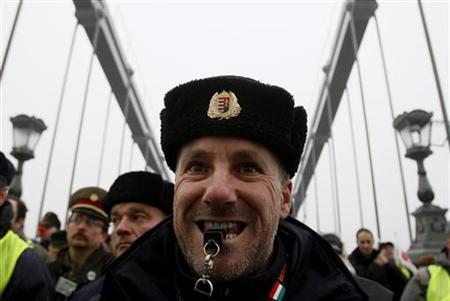(Reuters) – The deepening economic crisis is taking its toll on Hungarian Prime Minister Viktor Orban’s government — two years after a landslide election victory his party’s support is crumbling and three-quarters of voters believe the country is on the wrong track.

Growing disillusionment can be felt across the central European nation, whose economy is sliding into recession again after a sharp downturn in 2009, with the rising living standards that Orban promised when his party won power failing to materialize.
While still paying off a 2008 bailout from the European Union and the International Monetary Fund, the government is seeking a new financing backstop to shield the indebted economy from the neighboring euro zone’s mounting debt crisis.
Negotiations with the IMF will be difficult, however, as Orban will be reluctant to give up or tweak his Fidesz party’s main policies, including a flat income tax and family tax breaks aimed to support the middle class, the party’s core voter base.
Orban has been at loggerheads with Brussels over several laws that critics say served to cement his party’s strong powers beyond the end of his term, while huge windfall taxes imposed on banks and selected business sectors eroded investors’ trust.
“Orban is in a corner regarding his popularity: If he sticks to the status quo, the economy and living standards will be impacted. But if he does a U-turn, this will also be seen as implicit acknowledgement that his strategy was wrong,” said Mujtaba Rahman, analyst at think tank Eurasia Group.
The big game changer would be an escalation of the euro zone crisis, which could sharply weaken the forint currency and send Hungary’s markets plunging.
That, say analysts, would quickly drive the government to embrace IMF support despite Orban’s earlier rebuff of the Fund in the name of sovereignty over finances and economic policy.
When Hungarians gave Orban’s conservative Fidesz party a two-thirds parliamentary majority two years ago, they were hoping for a recovery, stability, and new jobs after years of successive Socialist governments.
Instead, most ordinary Hungarians, who have benefited little from the income tax cuts, feel life has turned into a grinding struggle as prices and taxes are rising.
“Things may have improved for the rich, but those who are poor will remain poor,” said Erzsebet Pupos, 46, who is selling vegetables and mushrooms at one of Budapest’s main markets.
“Nothing will change here, everything is just getting more expensive … The biggest problem is that there are no jobs.”
Discontent is palpable in the bustling market hall, with most people complaining about a surge in fuel and food prices. Inflation was running at 5.3 percent in May.
The forint is trading near 300 to the euro, sharply weaker from levels of 265 when Fidesz took power, even though it has firmed from record lows of 324 hit in early January when Hungary’s debt rating was cut to “junk”.
WIDE-SPREAD APATHY
According to a survey by pollster Median, Fidesz’ support dropped to its lowest in a decade at 22 percent last month, even though it still has a lead over the opposition Socialists, who stand at 16 percent. Far-right Jobbik hovers around 11 percent.
The survey showed 76 percent of the people are pessimistic about the country’s outlook while another recent poll by Ipsos showed this rate even higher, at 81 percent.
Half of Hungary’s 8 million electorate is undecided or would not vote if parliamentary elections were held now, although the next election is not due until 2014.
“I have become so skeptical that I would not (vote) for anybody,” said Maria Gubicsak who sells pickled vegetables and complains her customers are spending less and less.
“Unfortunately, people are getting poorer, the pensioners who used to buy a pound (of pickles) before, now ask for half a pound or less … Those young people who work for a bank, have two degrees and speak 3-4 languages, and those in information technology (are fine). But the rest are also suffering.”
Fidesz is still strong among its core voters and the opposition is fragmented. Orban’s strong anti-Brussels rhetoric, push for national sovereignty and combative style, which has turned him into a bugbear of Europe in the eyes of many, appeals to part of the population.
But the rapid erosion of Fidesz’ support will put pressure on Orban to act, while his hands are tied on the fiscal front and markets are pushing him to secure a deal with the IMF after months of delays.
“With the IMF or without the IMF, the government will be forced to keep the politically painful road of fiscal discipline, after six years of belt tightening, while the Hungarian public has developed a strong austerity fatigue,” said Peter Kreko, analyst at Political Capital.
FAIRY TALE?
Hungary’s economy shrank by 1.2 percent in the first quarter, posting the biggest quarterly drop in the whole of the 27-member EU. Analysts project only modest, 1.1 percent growth for next year according to a recent Reuters poll.
The government is more upbeat and says growth could pick up to 1.6 percent by 2013 on the back of two big automotive investments by Daimler and Audi.
A government spokesman said most of this growth would come from net exports, while a public works programme would employ at least 200,000 people this year and structural measures affecting the labor market would boost growth in the medium term.
“The present government governs by taking the steps which Hungarian society and economy needs in the medium term,” spokesman Andras Giro-Szasz said.
“The Hungarian fairy tale or the Hungarian example will be a successful one in a year’s time,” Economy Minister Gyorgy Matolcsy told CNN in a recent interview.
Few share his optimism.
The budget deficit will be below the EU’s 3 percent ceiling this year and next year, which is a significant achievement after a series of budget overshoots.
But unemployment remains high at about 11 percent, and investments are falling after unconventional measures in the past two years, including Europe’s biggest bank tax and a nationalization of private pension funds.
While cutting state spending, the government also hiked the main value-added tax rate to 27 percent from 25 in January and announced new taxes on telecoms services and financial transactions.
“I have three children and my income has increased significantly. We can say that I have benefited from the new tax policy,” said Attila Garai, who came for a snack lunch.
“I’m skeptical but hard working. I’m disappointed over what has been done, it seems rather hopeless but I don’t give up,” added Rita Giovannoli, who came for her daily shop. She says the worst is an increased uncertainty over the future.
(Reporting by Krisztina Than)





